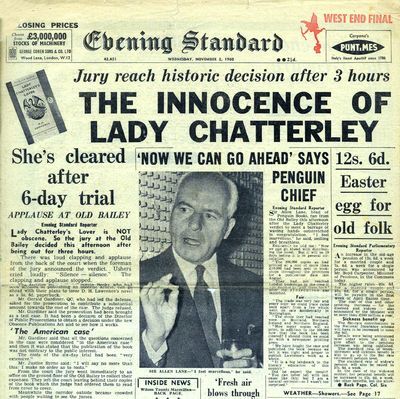Where were you when . . . ?
One of the pleasures of press day (on any paper, I should hope) is seeing readers' letters fall into place on the page, and marvelling at the unique knowledge they're prepared to share (when they're not spoiling for a fight, that is). The example below, from this week's issue of the TLS, begins as a response to some observations in the paper's NB column about the current scarcity of decent second-hand bookshops in Oxford, and turns into something else . . . .
"Sir, ��� I served as an American airman at RAF Upper Heyford outside Oxford from 1958 to 1961. Coming from a small town in Wisconsin that had no bookshops, I was delighted by the choices Oxford offered crew-cut Yank bibliophiles back in those tweedy times. My favourite was John Booksellers then in St Michael���s Street. On November 2, 1960, I was talking to John himself on the second floor when three undergraduates came thundering up the staircase shouting ���Lady Chatterley not guilty. Five copies please���. John made a phone call to confirm the verdict, and told the lads the official publication date was about a week off, but sold them a single copy from a stash behind the counter for 3/6. I settled for a copy of The Horse���s Mouth.
ROBERT NEUMAN
635 El Toro Way, Davis, California 95618."
(That link I've added, by the way, takes you to a masterly survey of Joyce Cary's reissued novels, including The Horse's Mouth, by Karl Miller; the piece happens to begin with a nod to Lawrence.)
Obstreperous customers, verbose customers, bores and drunks I've all encountered in bookshops, but never, in these enlightened times, undergraduates demanding "not guilty" D. H. Lawrence. Nor have I been sold Lady C from a secret stash behind the counter. I've been shopping in the wrong places, clearly.
Anyway: now you know where Mr Neuman was on that November afternoon when a jury of nine men and three women, after three hours' deliberation, found Penguin Books not guilty of "publishing an obscene article", in the form of Lawrence's novel. And thanks to the Evening Standard, pictured above, you know vaguely where Sir Allen Lane was, too: he "ran from the Old Bailey . . . to meet a barrage of waving hands outstretched in congratulation", although the paper declines to reveal where this barrage lay in waiting for Lawrence's champion. So if you happen to be old enough to remember and literary enough to care ��� where were you?
This question would be a less ghoulish literary-historical equivalent to the well-worn question of remembering where you were when JFK was assassinated ��� only literary history is, for the most part, an unhelpfully quiet affair, largely consisting of births, deaths and publication dates. Where were you when the last Harry Potter was published? In a queue outside Waterstones doesn't quite cut it, and nor does the initial question exactly quicken the pulse. It doesn't quicken mine at least. (That said, I have occasionally stayed up all night to read a new book in one delinquent gulp. Wild stuff, I know.) How about the doling-out of literary prizes? Too regular to be exciting.
And deaths? Well, morbidly perhaps, this version of where-were-you-when is a subject in its own right, and has been thought worthy of its own chronicles. I think there's a Penguin or Oxford edition of Hardy that recalls a headmaster who, in 1928, had broken down in tears while announcing to the school that the author had died. There is a whole book of responses (more than 200 letters), edited by Sybil Oldfield, to the death of Virginia Woolf in 1941. There is the awful story of Ted Hughes guiltily circling the memory of where he was and what he was doing on the night of another suicide: that of Sylvia Plath in February 1963 ��� which the recent "unauthorised Life" by Jonathan Bate has had some readers circling in turn.
More happily, and as mentioned previously on this blog, a celebration of Henry James took place earlier this month, on the centenary of his death. Professor Philip Horne of UCL organized this event, at Chelsea Old Church. That I hope I'll remember for a long time to come, not least for the fine leafy weather to cheer up what could have been a rather sombre occasion, and the excellent readings by the actors Simon Paisley Day, Miriam Margolyes and Olivia Williams, as well as Alan Hollinghurst, Tessa Hadley, Dr Oliver Herford and Professor Horne himself. What Maisie Knew was brilliantly disdainful yet moving; Daisy Miller was enticingly humorous (with Margolyes as the nine-year-old Randolph Miller); and James's riposte to that treacherous swine H. G. Wells reached far beyond its immediate purpose to magnificent, magnanimous effect. When the soprano Anna Sideris stood in front of the altar to sing "How beautiful it is", from Benjamin Britten's operatic adaptation of The Turn of Screw, that clinched it. This was art apotheosized rather than art on trial, and I'll try not to forget it . . . .
Peter Stothard's Blog
- Peter Stothard's profile
- 30 followers




